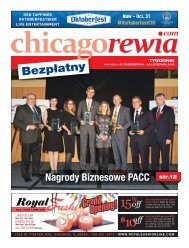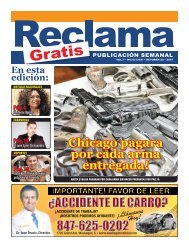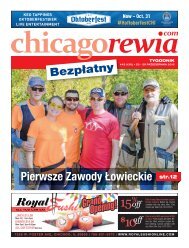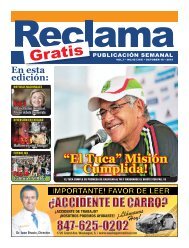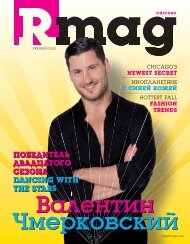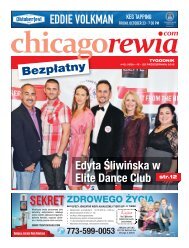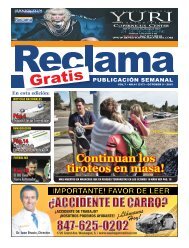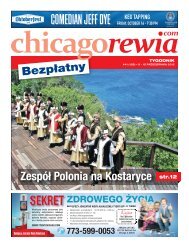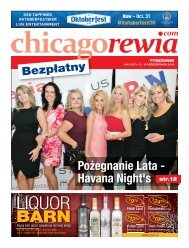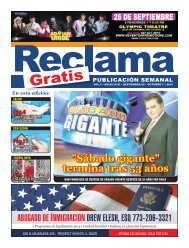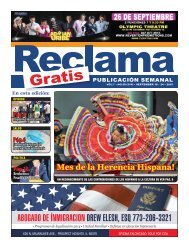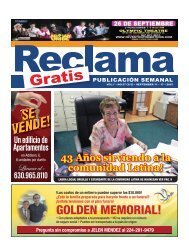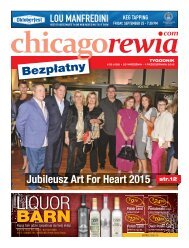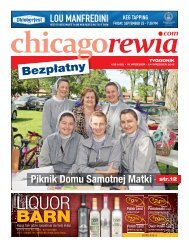Create successful ePaper yourself
Turn your PDF publications into a flip-book with our unique Google optimized e-Paper software.
FIRST GENERATION AMERICAN<br />
Drinks & Dialogue with<br />
Corinne Meier<br />
By: Ania Jablonowski<br />
God works in wonderful ways. As some<br />
of our readers know, I volunteer with<br />
the networking group, Connect.Inspire.<br />
Grow. Each month our group meets at St.<br />
John Brebeuf Church in Niles for a packing<br />
party to assemble lunches for the homeless, on<br />
behalf of St. Vincent DePaul’s aggregate food<br />
drive. Many parishioners know this as “Uncle<br />
Pete’s Food Drive”, in loving memory of Pete<br />
Zonsius. One day, I randomly stationed myself<br />
at the brown bag table alongside Corinne<br />
Meier, a first generation Swiss-American.<br />
After discovering how passionate Corinne was<br />
about her cultural experience, I invited her for<br />
an interview. Here is her story.<br />
“I was born in Switzerland, but raised in<br />
Coral Gables, Florida. My entire family and<br />
lineages are from there, so there’s only one<br />
American-born member in our family and<br />
that’s my brother,” says Corinne.”<br />
Corinne’s father had a business concept<br />
he wanted to launch, which her mom supported<br />
as she was not partial to the weather in<br />
Switzerland. “Life there is heavenly. It’s one of<br />
the most beautiful countries in the world. The<br />
weather can be like Chicago though, longwinded<br />
winters where you don’t see sunshine<br />
for days. The decision to launch the business<br />
was perhaps a bit influenced by the consistent<br />
sunshine that Miami could guarantee.”<br />
Her parents packed up their belongings<br />
and moved to the States when Corinne was 3<br />
months old. “My father rented, sold and leased<br />
used station wagons, vans, motor homes; any<br />
car for traveling and sightseeing. The kind that<br />
you could go camping in, where you could see<br />
the entire United States. It was called Swiss<br />
Am Drive”, she continues. “From the European<br />
perspective, when you visit the US, you<br />
want to see the entire country. They have the<br />
train system [in Europe] so he thought of his<br />
business the way customers would want to see<br />
the US – in its entirety. The economy was so<br />
strong in Switzerland in the ‘80s and ‘90s that<br />
people were able to afford it, and so it worked<br />
out well.<br />
It was this experience that exposed Corinne<br />
to the entire US landscape, from a Swiss-<br />
American perspective. She says, “It was one<br />
of the most beautiful ways to see the United<br />
States.”<br />
After her parents closed the business, they<br />
separated shortly thereafter, and Corinne’s<br />
mother moved to Chicago, while her father<br />
moved back to Switzerland. “As a licensed<br />
massage therapist and energy healer, my mom<br />
came here for the progressive alternative healing<br />
scene in Chicago. Her whole life’s intention<br />
revolves around building a natural healing<br />
practice. She currently works with cancer<br />
patients, right after chemo, to children with<br />
A.D.D. through LaHoChi Energy Healing, and<br />
she is also a Law of Attraction coach, hosting<br />
workshops in Chicago. She continues improving<br />
lives with all that she does.”<br />
Corinne remembers how she only had<br />
immediate family in the US for holidays. “We<br />
quickly built a tie with a huge Italian family in<br />
Miami, the DeNunzio’s. They treated us like<br />
we were part of their family, inviting us on all<br />
major holidays like Thanksgiving and Easter.<br />
They were European themselves, so it was<br />
almost as though they really were our family.”<br />
While visiting family in Switzerland,<br />
Corinne recalls, “It’s amazing. You land and<br />
everybody knows you are there. You got to<br />
see every member through a sit-down meal.<br />
Breakfast at one person’s house is followed by<br />
lunch at the next family member’s house. Food<br />
and conversation are a huge part of Swiss culture,<br />
where life is dedicated to large amounts<br />
of time for deep family bonding. In many parts<br />
of the country, the father will come home from<br />
the office to meet the kids and family for lunch<br />
while the children are in school. ”<br />
Before my interview with Corinne, I honestly<br />
did not know much about Switzerland.<br />
One element of these FGA interviews I truly<br />
appreciate is the Cultural 101.<br />
Corinne shares, “Switzerland as a country<br />
is divided into four areas. Italian, French,<br />
German and this little Romanian sliver, and<br />
regardless of the location, the directions on<br />
packaging for products to street signage are<br />
written in all four languages. In the German<br />
part, you speak Swiss, but read and write in<br />
German. Swiss is a dialect that flexes depending<br />
on what Swiss part you are in. Language<br />
is big and learning another language is a<br />
mandatory part of the school system. It is<br />
a country of precision, from homes being<br />
highly clean and organized - to never being<br />
able to say you were late because the train<br />
was late. A Swiss person is simply timely and<br />
well mannered. It’s ingrained in us at an early<br />
age, because people still live in small villages<br />
where everyone knows each other’s business.<br />
There are more unspoken rules than you can<br />
count and anything that bucks the system<br />
is immediately noticed. Standards are high<br />
for everything from education to business.<br />
A Swiss product is considered a high-quality<br />
product because they do not believe in cutting<br />
corners. Everyone has a true respect and love<br />
for nature. There is a deep understanding of<br />
waste management and how to be “eco”. For<br />
example, you have to pay per garbage bag. No<br />
matter where you go, you are surrounded by<br />
nature – from the city to the countryside. The<br />
air is fresh and they work hard to maintain<br />
that delicate balance. ”<br />
Corinne attended IB German programming<br />
from 3rd to 12th grade and has a minor<br />
in German from Florida State University. “I<br />
was lucky to inherit the Swiss language from<br />
my parents, giving me a head start on my<br />
German language fundamentals. This placed<br />
me into advanced language classes early on,<br />
which consisted of endless reading, writing<br />
and translating of poems. There was a beauty<br />
to this art of translation. I mean, the way the<br />
translation made us cross-compare the German<br />
versus American cultures. It was intense<br />
and often there was no direct English translation<br />
that would capture the same meaning;<br />
both interesting and challenging.”<br />
Directly influenced by her parents successful<br />
entrepreneurial spirits, Corinne decided to<br />
combine her passions for digital marketing,<br />
design, networking, fitness and dance into<br />
her own flourishing businesses. In addition to<br />
volunteering with Connect.Inspire.Grow, and<br />
Share Your Love, Corinne runs two exciting<br />
and unique brands. v<br />
Corinne Meier is the CEO and Founder of<br />
Meier Marketing, an inbound<br />
marketing agency working with Fortune<br />
500 companies to start-ups.<br />
Connect with Corinne at meiermarketing.com<br />
28<br />
revia reviamagazine.com <strong>#11</strong>, 2015




